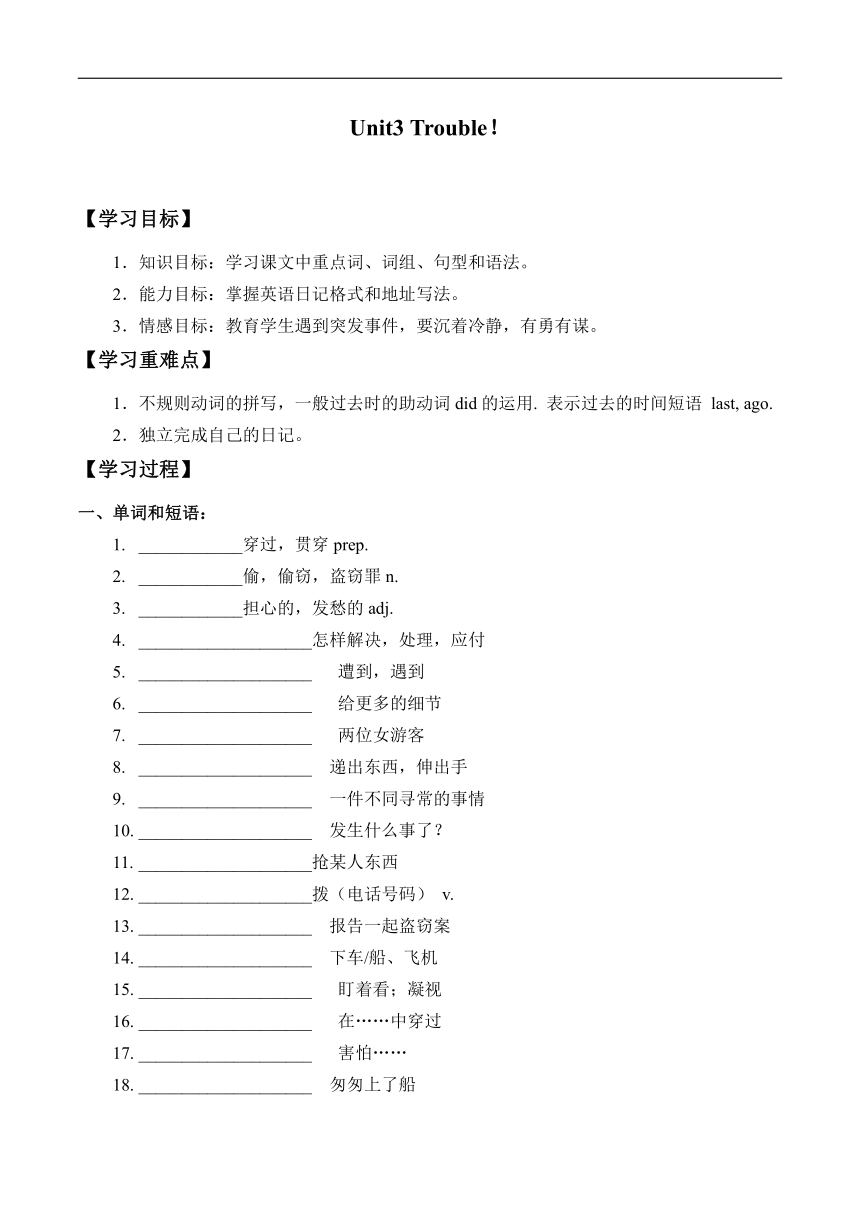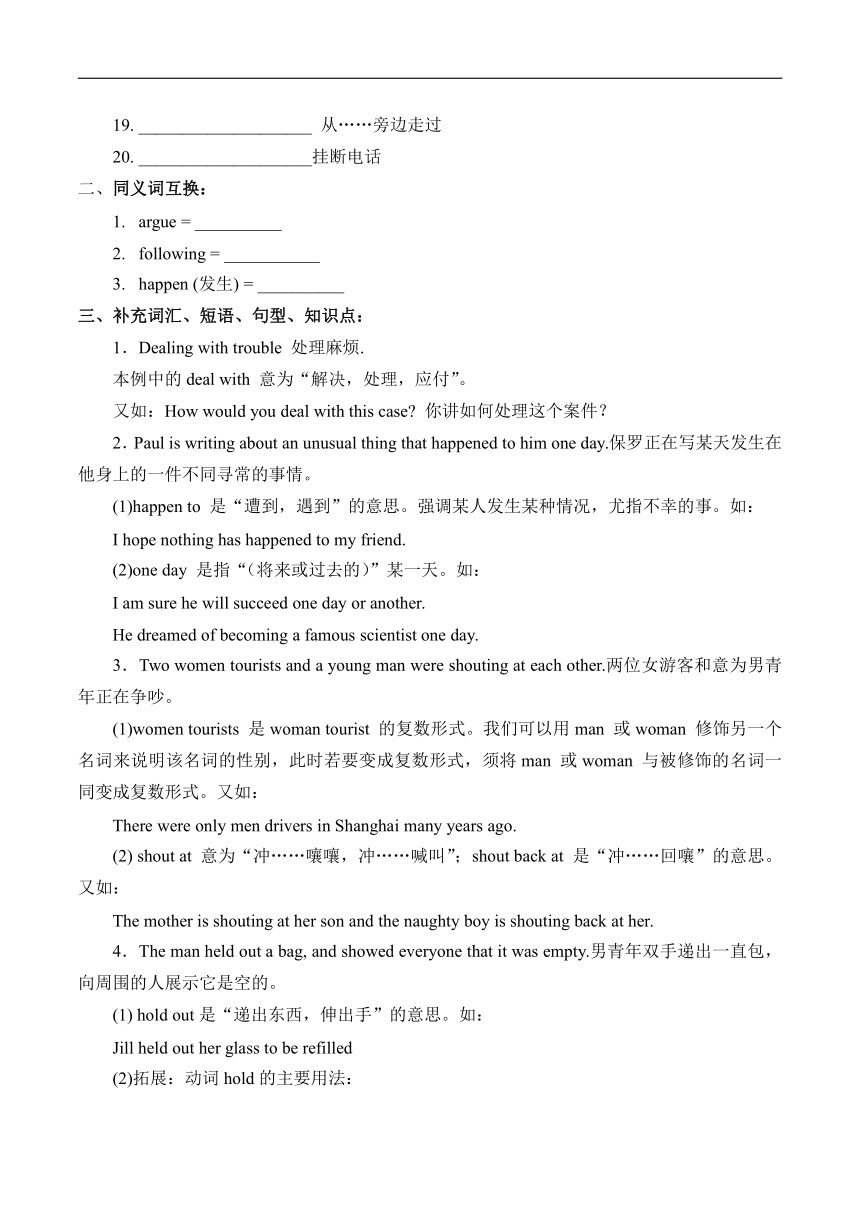牛津上海英语八年级上册 Module 1 Unit3 Trouble! 学案(无答案)
文档属性
| 名称 | 牛津上海英语八年级上册 Module 1 Unit3 Trouble! 学案(无答案) |  | |
| 格式 | doc | ||
| 文件大小 | 23.1KB | ||
| 资源类型 | 教案 | ||
| 版本资源 | 牛津上海版(试用本) | ||
| 科目 | 英语 | ||
| 更新时间 | 2021-09-22 14:23:01 | ||
图片预览


文档简介
Unit3
Trouble!
【学习目标】
1.知识目标:学习课文中重点词、词组、句型和语法。
2.能力目标:掌握英语日记格式和地址写法。
3.情感目标:教育学生遇到突发事件,要沉着冷静,有勇有谋。
【学习重难点】
1.不规则动词的拼写,一般过去时的助动词did的运用.
表示过去的时间短语
last,
ago.
2.独立完成自己的日记。
【学习过程】
一、单词和短语:
____________穿过,贯穿prep.
____________偷,偷窃,盗窃罪n.
____________担心的,发愁的adj.
____________________怎样解决,处理,应付
____________________
遭到,遇到
____________________
给更多的细节
____________________
两位女游客
____________________
递出东西,伸出手
____________________
一件不同寻常的事情
____________________
发生什么事了?
____________________抢某人东西
____________________拨(电话号码)
v.
____________________
报告一起盗窃案
____________________
下车/船、飞机
____________________
盯着看;凝视
____________________
在……中穿过
____________________
害怕……
____________________
匆匆上了船
____________________
从……旁边走过
____________________挂断电话
二、同义词互换:
argue
=
__________
following
=
___________
happen
(发生)
=
__________
三、补充词汇、短语、句型、知识点:
1.Dealing
with
trouble
处理麻烦.
本例中的deal
with
意为“解决,处理,应付”。
又如:How
would
you
deal
with
this
case?
你讲如何处理这个案件?
2.Paul
is
writing
about
an
unusual
thing
that
happened
to
him
one
day.保罗正在写某天发生在他身上的一件不同寻常的事情。
(1)happen
to
是“遭到,遇到”的意思。强调某人发生某种情况,尤指不幸的事。如:
I
hope
nothing
has
happened
to
my
friend.
(2)one
day
是指“(将来或过去的)”某一天。如:
I
am
sure
he
will
succeed
one
day
or
another.
He
dreamed
of
becoming
a
famous
scientist
one
day.
3.Two
women
tourists
and
a
young
man
were
shouting
at
each
other.两位女游客和意为男青年正在争吵。
(1)women
tourists
是woman
tourist
的复数形式。我们可以用man
或woman
修饰另一个名词来说明该名词的性别,此时若要变成复数形式,须将man
或woman
与被修饰的名词一同变成复数形式。又如:
There
were
only
men
drivers
in
Shanghai
many
years
ago.
(2)
shout
at
意为“冲……嚷嚷,冲……喊叫”;shout
back
at
是“冲……回嚷”的意思。又如:
The
mother
is
shouting
at
her
son
and
the
naughty
boy
is
shouting
back
at
her.
4.The
man
held
out
a
bag,
and
showed
everyone
that
it
was
empty.男青年双手递出一直包,
向周围的人展示它是空的。
(1)
hold
out是“递出东西,伸出手”的意思。如:
Jill
held
out
her
glass
to
be
refilled
(2)拓展:动词hold的主要用法:
1)握,持,抱,搂
She
held
a
baby
in
her
arm.
2)
保持
Hold
your
hand
up.
3)
装,容纳
The
car
can
hold
five
people.
4)
使发生,举行
The
meeting
was
held
in
the
town
hall.
5)
持有
He
holds
a
Swiss
passport.
5.Dad
just
smiled.爸爸只是笑了笑。
(1)just
是副词,意为“只是,仅仅是”,如:
He
is
just
a
child.
(2)拓展:副词just的主要用法:
1)
多用于完成时态中,置于动词与助动词之间,意为“刚刚,刚才”,如:
I
have
just
finished
my
homework.
2)
恰恰,正好(不用于否定句中,相当于exactly),如:
It’s
just
half
past
six.
3)
相当于only,
意为“仅仅,只是”,如:
I
was
just
five
years
old
then.
4)
用于祈使句中,以引起别人对某事的注意,有时也可以使语气婉转一些,意为“就,请”,如:
Just
listen
to
me.
5)
与just相关的短语
just
now
用于过去时,意为“刚才”,即a
moment
ago.
just
as
正如,恰似
just
then
就在那时
just
the
same
照样
四、词性互换
argue
(n.)
–
________
(n.)
rob
(v.)
–
__________
(n.)
following
(a.)
–
__________(v.)
usual
(a.)
–
__________
(反a.)
hurry
(v.
/
n.)
–
__________(a.)
report
(v.
/
n.)
–
__________
(n.)
五、练习
The
babies
are
sleeping.
Please
leave
the
room__________.(quiet)
The
___________were
arrested
at
last.(rob)
Tom
went
to
school
in
a
_______in
order
narrow
to
be
late
again.(hurried)
Mrs.
Smith
had
an______
with
her
neighbor
yesterday.
(argue)
Trouble!
【学习目标】
1.知识目标:学习课文中重点词、词组、句型和语法。
2.能力目标:掌握英语日记格式和地址写法。
3.情感目标:教育学生遇到突发事件,要沉着冷静,有勇有谋。
【学习重难点】
1.不规则动词的拼写,一般过去时的助动词did的运用.
表示过去的时间短语
last,
ago.
2.独立完成自己的日记。
【学习过程】
一、单词和短语:
____________穿过,贯穿prep.
____________偷,偷窃,盗窃罪n.
____________担心的,发愁的adj.
____________________怎样解决,处理,应付
____________________
遭到,遇到
____________________
给更多的细节
____________________
两位女游客
____________________
递出东西,伸出手
____________________
一件不同寻常的事情
____________________
发生什么事了?
____________________抢某人东西
____________________拨(电话号码)
v.
____________________
报告一起盗窃案
____________________
下车/船、飞机
____________________
盯着看;凝视
____________________
在……中穿过
____________________
害怕……
____________________
匆匆上了船
____________________
从……旁边走过
____________________挂断电话
二、同义词互换:
argue
=
__________
following
=
___________
happen
(发生)
=
__________
三、补充词汇、短语、句型、知识点:
1.Dealing
with
trouble
处理麻烦.
本例中的deal
with
意为“解决,处理,应付”。
又如:How
would
you
deal
with
this
case?
你讲如何处理这个案件?
2.Paul
is
writing
about
an
unusual
thing
that
happened
to
him
one
day.保罗正在写某天发生在他身上的一件不同寻常的事情。
(1)happen
to
是“遭到,遇到”的意思。强调某人发生某种情况,尤指不幸的事。如:
I
hope
nothing
has
happened
to
my
friend.
(2)one
day
是指“(将来或过去的)”某一天。如:
I
am
sure
he
will
succeed
one
day
or
another.
He
dreamed
of
becoming
a
famous
scientist
one
day.
3.Two
women
tourists
and
a
young
man
were
shouting
at
each
other.两位女游客和意为男青年正在争吵。
(1)women
tourists
是woman
tourist
的复数形式。我们可以用man
或woman
修饰另一个名词来说明该名词的性别,此时若要变成复数形式,须将man
或woman
与被修饰的名词一同变成复数形式。又如:
There
were
only
men
drivers
in
Shanghai
many
years
ago.
(2)
shout
at
意为“冲……嚷嚷,冲……喊叫”;shout
back
at
是“冲……回嚷”的意思。又如:
The
mother
is
shouting
at
her
son
and
the
naughty
boy
is
shouting
back
at
her.
4.The
man
held
out
a
bag,
and
showed
everyone
that
it
was
empty.男青年双手递出一直包,
向周围的人展示它是空的。
(1)
hold
out是“递出东西,伸出手”的意思。如:
Jill
held
out
her
glass
to
be
refilled
(2)拓展:动词hold的主要用法:
1)握,持,抱,搂
She
held
a
baby
in
her
arm.
2)
保持
Hold
your
hand
up.
3)
装,容纳
The
car
can
hold
five
people.
4)
使发生,举行
The
meeting
was
held
in
the
town
hall.
5)
持有
He
holds
a
Swiss
passport.
5.Dad
just
smiled.爸爸只是笑了笑。
(1)just
是副词,意为“只是,仅仅是”,如:
He
is
just
a
child.
(2)拓展:副词just的主要用法:
1)
多用于完成时态中,置于动词与助动词之间,意为“刚刚,刚才”,如:
I
have
just
finished
my
homework.
2)
恰恰,正好(不用于否定句中,相当于exactly),如:
It’s
just
half
past
six.
3)
相当于only,
意为“仅仅,只是”,如:
I
was
just
five
years
old
then.
4)
用于祈使句中,以引起别人对某事的注意,有时也可以使语气婉转一些,意为“就,请”,如:
Just
listen
to
me.
5)
与just相关的短语
just
now
用于过去时,意为“刚才”,即a
moment
ago.
just
as
正如,恰似
just
then
就在那时
just
the
same
照样
四、词性互换
argue
(n.)
–
________
(n.)
rob
(v.)
–
__________
(n.)
following
(a.)
–
__________(v.)
usual
(a.)
–
__________
(反a.)
hurry
(v.
/
n.)
–
__________(a.)
report
(v.
/
n.)
–
__________
(n.)
五、练习
The
babies
are
sleeping.
Please
leave
the
room__________.(quiet)
The
___________were
arrested
at
last.(rob)
Tom
went
to
school
in
a
_______in
order
narrow
to
be
late
again.(hurried)
Mrs.
Smith
had
an______
with
her
neighbor
yesterday.
(argue)
